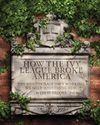
Very few Americans-or, for that matter, very few people on the planet-can remember a time when freedom of the seas was in question. But for most of human history, there was no such guarantee. Pirates, predatory states, and the fleets of great powers did as they pleased. The current reality, which dates only to the end of World War II, makes possible the commercial shipping that handles more than 80 percent of all global trade by volume oil and natural gas, grain and raw ores, manufactured goods of every kind. Because freedom of the seas, in our lifetime, has seemed like a default condition, it is easy to think of it-if we think of it at all-as akin to Earth's rotation or the force of gravity: as just the way things are, rather than as a man-made construct that needs to be maintained and enforced.
But what if the safe transit of ships could no longer be assumed? What if the oceans were no longer free?
Every now and again, Americans are suddenly reminded of how much they depend on the uninterrupted movement of ships around the world for their lifestyle, their livelihood, even their life. In 2021, the grounding of the container ship Ever Given blocked the Suez Canal, forcing vessels shuttling between Asia and Europe to divert around Africa, delaying their passage and driving up costs. A few months later, largely because of disruptions caused by the coronavirus pandemic, more than 100 container ships were stacked up outside the California Ports of Long Beach and Los Angeles, snarling supply chains throughout the country.
هذه القصة مأخوذة من طبعة April 2023 من The Atlantic.
ابدأ النسخة التجريبية المجانية من Magzter GOLD لمدة 7 أيام للوصول إلى آلاف القصص المتميزة المنسقة وأكثر من 9,000 مجلة وصحيفة.
بالفعل مشترك ? تسجيل الدخول
هذه القصة مأخوذة من طبعة April 2023 من The Atlantic.
ابدأ النسخة التجريبية المجانية من Magzter GOLD لمدة 7 أيام للوصول إلى آلاف القصص المتميزة المنسقة وأكثر من 9,000 مجلة وصحيفة.
بالفعل مشترك? تسجيل الدخول

The Dark Origins of Impressionism
How the violence and deprivation of war inspired light-filled masterpieces

The Magic Mountain Saved My Life
When I was young and adrift, Thomas Manns novel gave me a sense of purpose. Today, its vision is startlingly relevant.

The Weirdest Hit in History
How Handel's Messiah became Western music's first classic

Culture Critics
Nick Cave Wants to Be Good \"I was just a nasty little guy.\"

ONE FOR THE ROAD
What I ate growing up with the Grateful Dead

Teaching Lucy
She was a superstar of American education. Then she was blamed for the country's literacy crisis. Can Lucy Calkins reclaim her good name?

A BOXER ON DEATH ROW
Iwao Hakamada spent an unprecedented five decades awaiting execution. Each day he woke up unsure whether it would be his last.

HOW THE IVY LEAGUE BROKE AMERICA
THE MERITOCRACY ISN'T WORKING. WE NEED SOMETHING NEW.

Against Type
How Jimmy O Yang became a main character

DISPATCHES
HOW TO BUILD A PALESTINIAN STATE There's still a way.